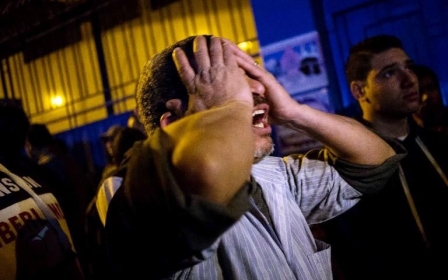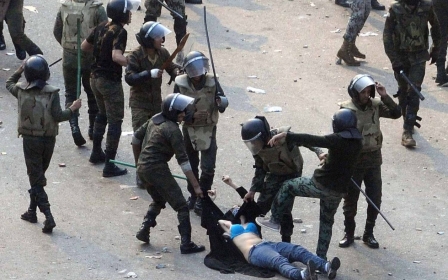The struggles - and hopes - of Hend Nafea
Over the last three years, the young Egyptian revolutionary woman Hend Nafea has been struggling and rebelling against her country’s various governments, against her rural society, and against her family. For it, she has been beaten and tortured by army officers, imprisoned at home by her family, and judged as being a shameful woman by her society. Last week, she was also sentenced to life in prison by an Egyptian judge known for his harsh rulings. And, yet, the colourfully headscarfed woman remains determined to struggle on.
Upon hearing the widely criticised verdict in her case on 4 February, she wrote in a public post on her Facebook wall: “I want to tell you something: whatever we have done, we still haven’t done anything for the revolution . . . there are many martyrs that have given their lives for this country! And I’m reminded of what my colleague Mahienour [El-Massry] said: ‘We don’t like prisons, but we’re not afraid of them’.” She ends this written post with a smiley face. It’s a spirited defiance she has displayed ever since her ordeal began just over three years ago.
Hend’s story isn’t unique. In her case alone, 229 others were sentenced to life in prison, including the well-known activist Ahmed Douma, for protests outside a government building in 2011 demanding an end to military rule. Two days before that, 183 people were sentenced to death.
Thousands of people have been arrested and tortured in detention in Egypt before the 2011 revolution and after it. Thousands have also been killed ever since millions took to the streets on 25 January 2011 demanding an end to the brutal regime of Hosni Mubarak, the dictator that ran the country for nearly 30 years. That brutality has become even worse since a popularly-backed military coup removed the elected president Mohamed Morsi from power in July 2013 and eventually brought in the current regime of President Abdel Fattah al-Sisi, a former head of the army.
And, yet, I still think it’s necessary to hear people’s individual stories. In doing so, we continue to learn more about the struggles they face as individuals and within their society. And, in particular, when the person struggling is a woman. She often faces the added burden of what people see as her rightful place in society, especially when she comes from the countryside where conservatism and traditions often run higher than in the city. When we get closer to understanding the struggle, one hopes we may also find a way out. So here’s Hend’s story.
Early on the morning of Friday 16 December 2011, Hend went to downtown Cairo to check on the protesters that had been peacefully camped outside the government’s Cabinet building. She had been doing so every day, without her family’s knowledge, since the protesters began their sit-in there three weeks earlier, demanding that the army council running the country hand over power to a civilian government.
That morning, the protests turned violent after a bloodied protester, a young man named Aboudi, was arrested and beaten up by soldiers, which infuriated other protesters. Clashes erupted between protesters and army officers, who hurled stones at each other. Video footage shows soldiers pelting protesters with stones from above the Parliament building that morning. They also threw furniture. In the ensuing fight, the interior of the historic Institute of Egypt building, which housed rare 200-year-old manuscripts, was burned and turned into a little more than charcoal debris.
Hend was the first woman to be arrested that day, she said, after she was caught in a kettle between protesters and army officers. Soldiers removed her headscarf, beat her head and body with sticks and batons, dragged her by the hair through downtown Cairo and tore her clothes off. She was then taken into one of the Cabinet’s rooms, which she and other female protesters who were arrested that day came to refer to as “the torture room”, she said. There they were electrocuted and beaten repeatedly.
The next day, the woman who came to be referred to in Western media as “the blue bra girl” and in Egyptian media as “Set El Banat” (loosely understood as ‘the woman of all women’) was caught on camera being dragged by army officers through Cairo’s Tahrir Square, her clothes torn off to reveal her blue bra, and soldiers kicking her with their boots. The image made the front page of the New York Times and Egypt’s El-Tahrir newspaper. Tahrir’s headline that day was just one word: “Liars” – in reference to the army’s then claims that it doesn’t attack protesters.
Hend believes that the army’s strategy at the time was to arrest a woman over a man, if they had the chance to do so. “They wanted to break society through girls,” she told television host Reem Maged in October 2012. The idea being that they were playing on Egyptian society’s already conservative views of women that her place is in the home and with the family, rather than on the streets protesting. Officers knew that social attitudes would blame, rather than support, protesting women. “They were able to succeed,” said Hend. “The society’s response was: ‘Well, what took her to Tahrir in the first place’.”
When she was finally able to return home, Hend said she faced beatings and harsh words by her family. She was called an embarrassment and someone who had brought shame on the family. Instead of being proud that Hend had managed to stand up to the head of the country at the time, Field Marshal Hussein Tantawi, by refusing to greet him when he came to visit her in hospital, her family imprisoned her at home and prevented her from accessing her mobile and the internet. She didn’t give up.
It was nearing the revolution’s first anniversary on 25 January 2012, and Hend was feeling frustrated and suffocated by her house arrest. So she went on a hunger strike.
“I convinced myself that I could make a revolution in my house,” she said.
With white paper plastered across the walls of her room, she wrote her demands: “Hend wants an end to the siege.” “I am not embarrassment or shameful, I’m one of the revolutionaries.” “I won't go back on my goals and ideas and position.” “We will continue even if inside the cells,” and so on. After she fainted, her family eventually backed down.
Fast forward three years and things haven’t gotten any better for Hend. When she was sentenced this week, she also wrote on Facebook: “I don’t know how to respond to my family. I don’t know what to tell them after this life sentence. Now I’m going to enter a new battle with them, and I couldn’t believe that things had gotten a little quieter.” This was followed by a sad smiley.
Hend is and isn’t being uniquely targeted. As mentioned, thousands have been arrested, beaten, tortured and killed in the course of this revolution. She’s one of them. But the authorities do also have a reason to fear Hend’s dream for justice.
She told the television host Reem Maged in 2012 that she’s part of a campaign called “Nation Without Torture” made up of a group of people that have experienced torture since the start of the revolution.
“We’re trying to collect pictures of all those people who have tortured revolutionaries from the beginning of the revolution till now, collecting the name of officers, inside the prisons and outside of it. We’re going to make human chains in front of their houses. We’re going to issue joint legal complaints against them,” she boldly said.
One part of Hend’s dream is to hold those that have tortured and killed accountable. That hasn’t happened in Egypt to date. Hosni Mubarak, who ran the country for nearly thirty years, and who was the commander-in-chief during the 18 day uprising when over 800 people were killed, had the life sentence against him for ordering the killing of protesters overturned in 2013. Tantawi, who ran the country and was head of the army during Hend’s ordeal, was given a safe exit and awarded the country’s top honour, the Order of the Nile, for “invaluable services to the nation”. According to Amnesty International, “to date no security officers have been held to account for the killing of 1,000 protesters in August 2013.” That’s selective justice, and not the kind Hend has in mind.
No wonder Nagy Shehata, the judge in Hend’s and several other well-known cases, including the Al-Jazeera trial, is issuing harsh verdicts. As a self-declared Sisi supporter, he has something to fear – his stake in the ruling, unaccountable order.
In Egypt, many of those who took to the streets in 2011 with the slogan “bread, freedom and social justice” and continue to struggle for its principles now find themselves behind bars, while remnants of the old order either walk free or have taken power. Revolutionaries have a long way to go, particularly its women. But as long as they have Hend’s spirited defiance, hope remains alive.
- Nadine Marroushi is a British-Palestinian journalist who has worked for Bloomberg and the English edition of Al-Masry Al-Youm (also known as Egypt Independent), and as a freelance journalist has written for The National newspaper in the UAE, and the London Review of Books blog. She has also been published by the Financial Times, and other international publications.
The views expressed in this article belong to the author and do not necessarily reflect the editorial policy of Middle East Eye.
Photo credit: A photo of Hend Nafea after she was assaulted by Egyptian police in 2011 (Twitter/@intifadayayin)
New MEE newsletter: Jerusalem Dispatch
Sign up to get the latest insights and analysis on Israel-Palestine, alongside Turkey Unpacked and other MEE newsletters
Middle East Eye delivers independent and unrivalled coverage and analysis of the Middle East, North Africa and beyond. To learn more about republishing this content and the associated fees, please fill out this form. More about MEE can be found here.





